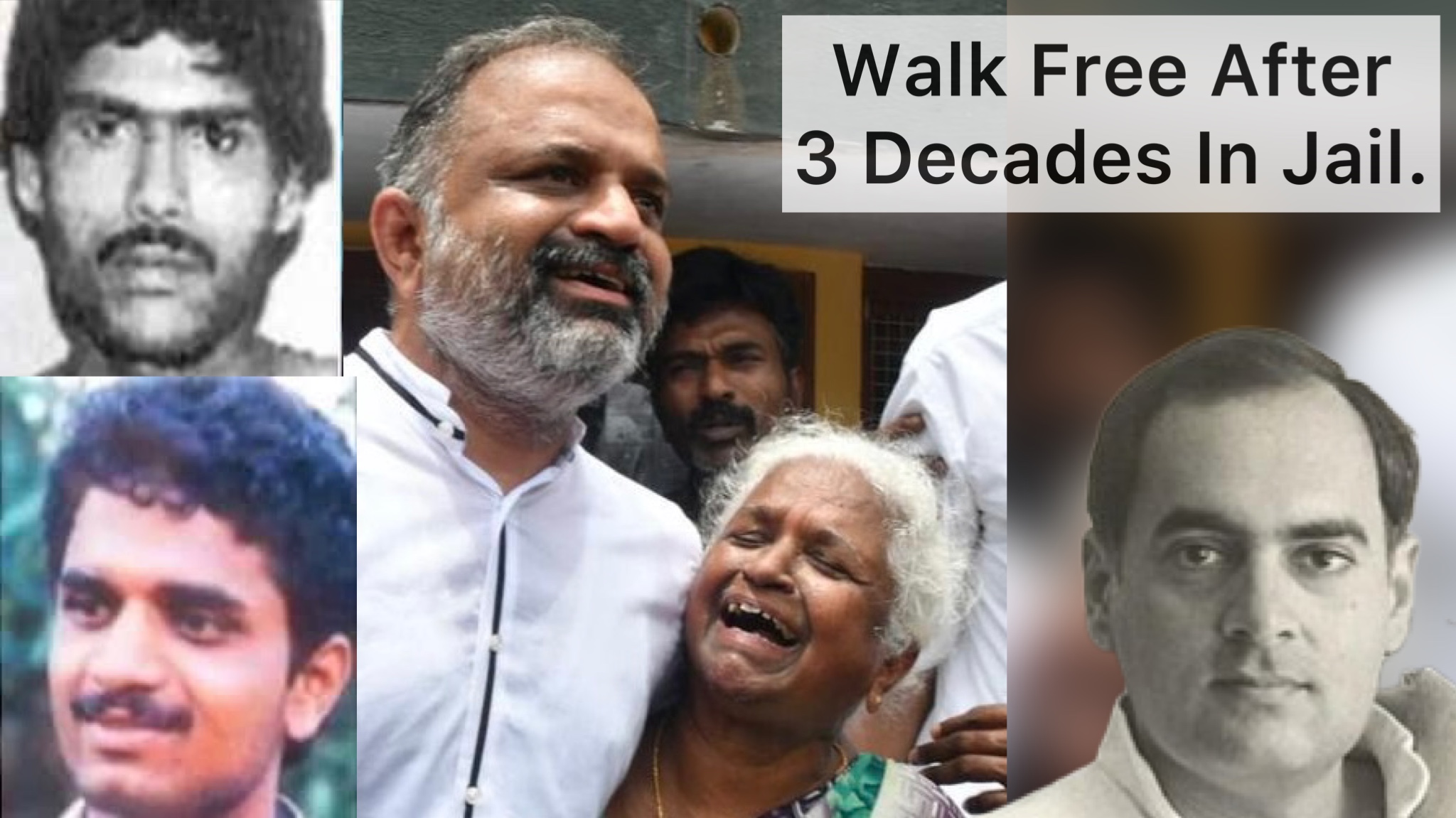It is a case related to national security and assault on the head of the state. Even otherwise, to kill someone is a heinous crime that societies should never pardon. But Perarivalan’s release has many layers. Is he a victim of a lapse in the system? Does his release after three decades of jail term prove that he was not complicit in the crime in any possible way? While the verdict merits humanitarian and regional considerations, has it neglected social precedent and national interests? The debate would remain for a long time.
Peraraivalan’s Release
AG Perarivalan, convicted in the Rajiv Gandhi assassination case, was released on May 18 by the Supreme Court. Speaking to the media after his release, Perarivalan thanked his mother, Arputhammal, who had fought a three-decade-long unrelenting judicial battle to get him released.
Soon as the news broke out, wellwishers and functionaries from political outfits gathered at his house in Jolarpet to greet him. Neighbors and supporters distributed sweets and burst crackers to celebrate his release.
Role in the crime and confession statement
He had spent 31 years in jail for buying two 9-volt batteries for the LTTE — which used them to detonate the human bomb that killed the former prime minister Rajiv Gandhi in Sriperumbudur, Chennai, in 1991.
Perarivalan was just 19 years old then, with a diploma in electronics and communication. The LTTE had entrusted the job of compiling news in Tamil and English, recording video cassettes, and sending it to them to Sri Lanka.
However, Perarivalan, in his confession, stated that he had ‘absolutely no idea’ why he was buying the batteries. Former CBI officer V Thiagarajan later revealed to the Supreme Court in 2017 that his investigating agency had omitted to record this part of Perarivalan’s confession.
The case details say that on the fateful night of May 21, 1991 (when Rajiv Gandhi was assassinated), Perarivalan had gone to watch a movie and learned about the assassination only after returning. However, it is also true that he aided LTTE in procuring a two-wheeler and a film roll and was present during a dry-run conducted by his fellow convicts, Nalini, her husband Sriharan, and others.
Death sentence commuted to life imprisonment
Later Perarivalan was tried for 30 charges under the Indian Penal Code (IPC), Telegraphy Act, Passport Act, and the currently extinct TADA rule. Eventually, all 26 convicts, including Perarivalan, were sentenced to death by the TADA court in 1998. Though the SC upheld the death sentence in the succeeding year, later in 2014, it commuted it to life imprisonment.
In jail, he was a model prisoner with unblemished prison records. His incident-free outings gave assurance to successive governments to offer him parole. Inside the prison, he also completed BCA and MCA courses and penned a book titled: ‘Thookku Kottatadiyil Irunthu oru Maurayeettu Madal’ — meaning an appeal from the gallows.
Judicial battle and regional politics
Perarivalan took cues from the commutation of sentences and premature release of Sanjay Dutt in the 1993 Mumbai bomb blast case. He appealed to the Tamil Nadu state cabinet, President and Governor’s offices, the Madras High court, and the Supreme Court seeking a premature release.
The Tamil Nadu Government sought remission of his life term, initially in 2016, then in 2018, and again in 2021. Indeed then chief minister J Jayalalitha vouched that she would release Rajiv Gandhi assassination convicts even if the center declined consent. But the cabinet resolutions suffered unexplainable delays at the Governor’s and later at the President’s end. Referring to this, the SC verdict said that the state governments have the authority to advise the governors on remission pleas, and they need not wait for the President’s assent to decide.
Finally, on May 18, invoking Article 142 of the constitution, which grants ‘ Extraordinary’ power to do complete justice, the SC announced the release of AG Perarivalan. However, the court also observed that it should now be through the Governor’s office — a route that would be swifter, humane, and just.
Reactions from political parties
The top court’s verdict has evoked mixed responses from across the political spectrum in the country. Regional parties in Tamil Nadu, DMK, ADMK, MDMK, and NTK welcomed his release. Tamil Nadu CM Stalin, who received AG Perarivalan, called the verdict “historic.”
But DMK’s national ally, the Congress party, expressed its displeasure stating, “Today is a sad day for the country. There is a sorrow and fury not only in every congress worker but in every Indian.” On Thursday, the Tamil Nadu Congress Committee (TNCC) members protested against Perarivalan’s release with a white cloth covering their mouths across the state.

